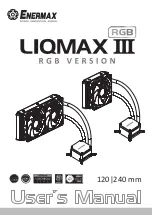
Kp, Ki, and Kd Registers
155
SNIU028A – February 2016 – Revised April 2016
Copyright © 2016, Texas Instruments Incorporated
Filter
4.6
Kp, Ki, and Kd Registers
There are several registers which hold the Kp, Ki, and Kd coefficients:
FILTERKPCOEF0
FILTERKPCOEF1
FILTERKICOEF0
FILTERKICOEF1
FILTERKDDOEF0
FILTERKDCOEF1
These registers hold all of the coefficients for the PID for the various coefficient sets as described above.
For specific details, see the Filter Reference chapter below. All of the K coefficients are 16 bit signed
numbers. They are stored 1 or 2 per register. Systems which do not use nonlinear mode only need to load
Coefficient Set A. Here is an example:
Filter1Regs.FILTERKPCOEF0.bit.KP_COEF_0 = 500;
Filter1Regs.FILTERKICOEF0.bit.KI_COEF_0 = 150;
Filter1Regs.FILTERKDCOEF0.bit.KD_COEF_0 = 250;
4.7
Alpha Registers
The FILTERKDALPHA register holds the two alpha coefficients which can be selected by the
BINx_ALPHA bits in the COEFCONFIG register. Alpha is stored as a 9 bit signed number. Here is an
example which only loads KD_ALPHA_0:
Filter1Regs.FILTERKDALPHA.bit.KD_ALPHA_0 = 134;
4.8
Filter Nonlinear Limit Registers
There are 6 nonlinear limits, as shown above in
. These are 9 bit signed numbers, although
they must be positive for symmetric mode. They are stored 2 to a register in three registers:
FILTERNL0
FILTERNL1
FILTERNL2
Here is a code example loading them for symmetric mode:
Filter1Regs.FILTERNL2.bit.LIMIT5 = 218; //symmetric values
Filter1Regs.FILTERNL2.bit.LIMIT4 = 182;
Filter1Regs.FILTERNL1.bit.LIMIT3 = 145;
Filter1Regs.FILTERNL1.bit.LIMIT2 = 109;
Filter1Regs.FILTERNL0.bit.LIMIT1 = 72;
Filter1Regs.FILTERNL0.bit.LIMIT0 = 36;
















































